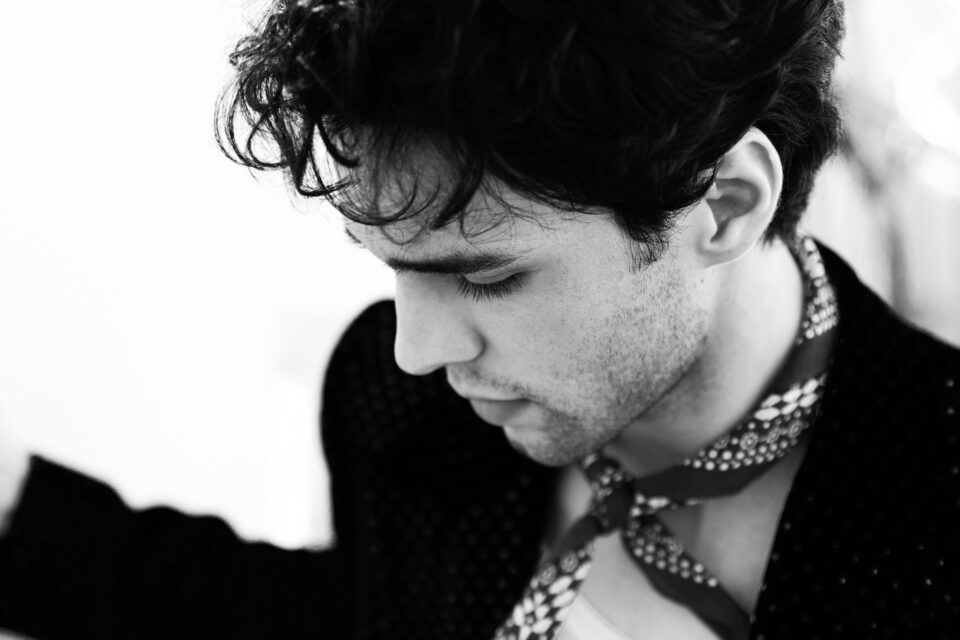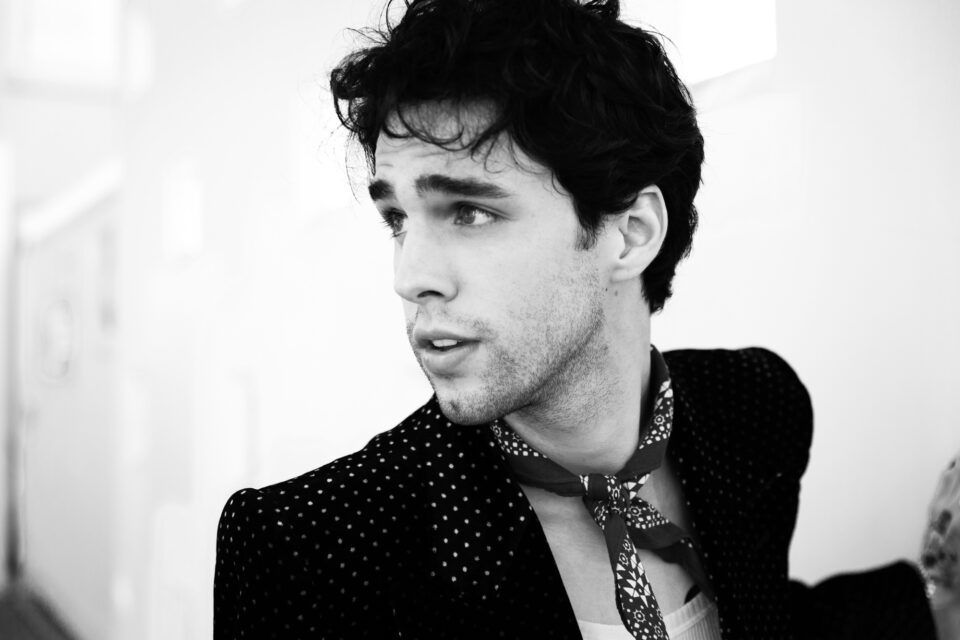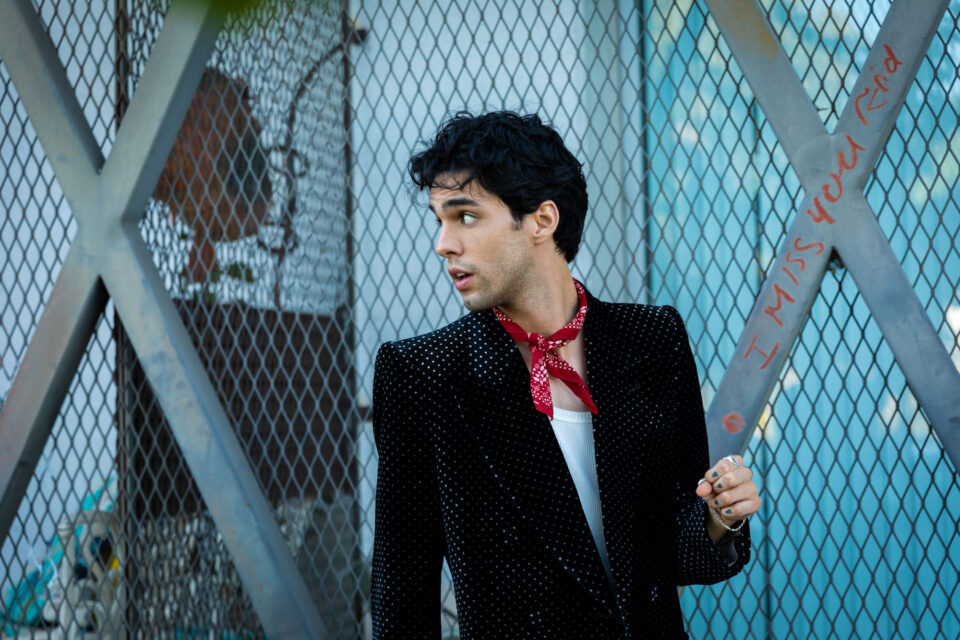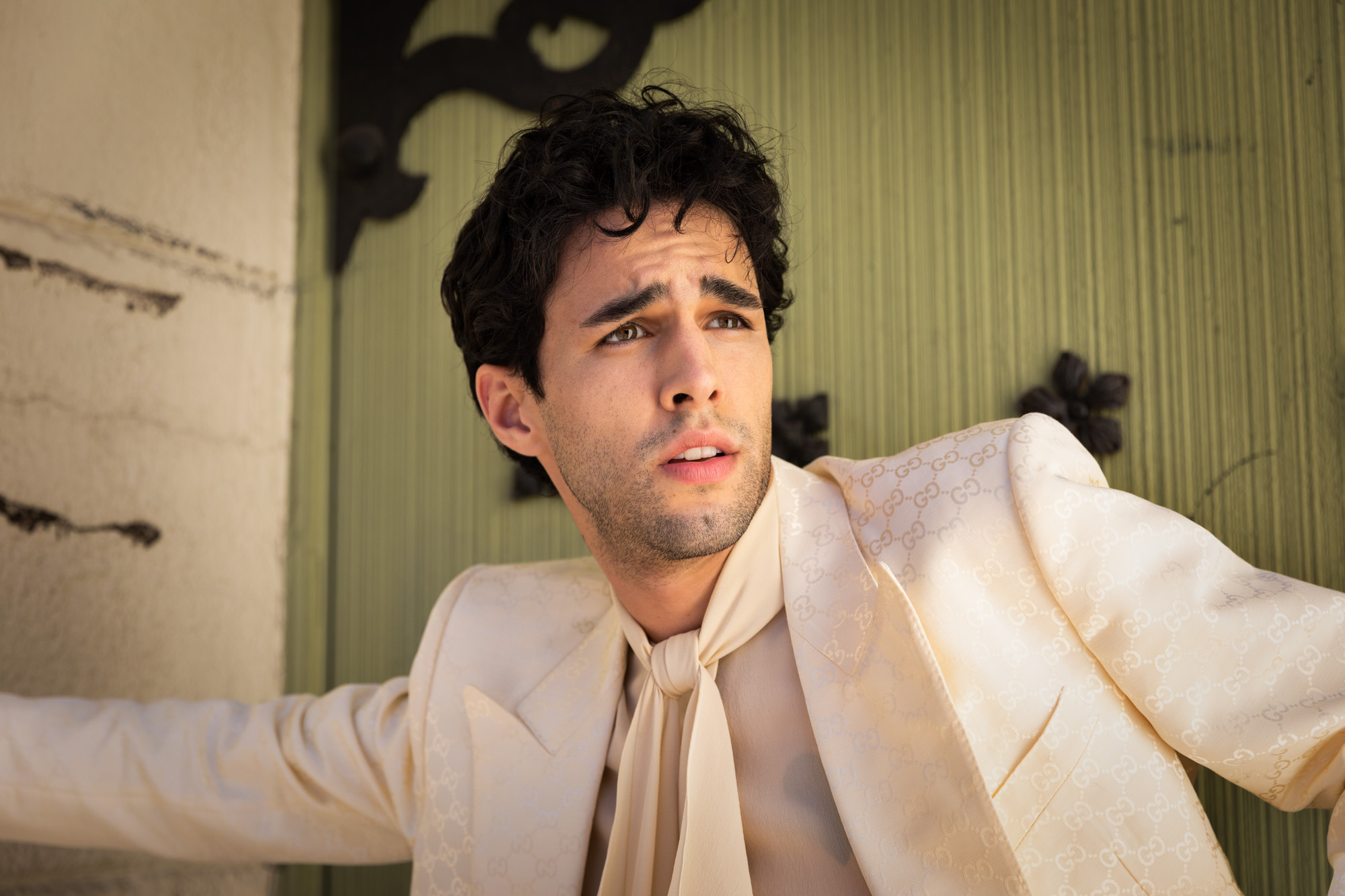Given his affinity for all things vintage—from the sweet crooning of the ’50s to the freedom and fashion of the swinging ’60s—it’s only fitting that Stephen Sanchez’s debut album is a throwback both in sound and format. The 20-year-old’s obsession with mid-20th century music shapes Angel Face, a wildly ambitious concept album that guides the listener through a twisty tale of love, deceit, bad decisions, and, ultimately, murder.
“The album is set from 1958 through 1964,” Sanchez explains, “and it tells the love story of The Troubadour and Evangeline.” The latter femme fatale was formerly entangled with a mob boss, who isn’t too happy about her moving on, and things get bloody. The plot was inspired by Marty Robbins’ 1959 classic “El Paso,” a so-called “gunfighter ballad” about a cowboy shooting a fella for flirting with his girl. “I love the drama and excitement of it all,” Sanchez raves.
Concept albums are heading for extinction due to the domination of haphazardly curated playlists and the fact that a narrative requires the artist to take a step back. But that distance is exactly what appeals to Sanchez. “It makes it so much more interesting for me because it’s less about me and more about characters and a story,” he says. “It becomes all about the record and the music. That’s really exciting for me.”

Not only that, but the elaborate framework allows Sanchez to craft songs about matters of the heart—his favorite topic—from a multitude of angles. For instance, recent single “Be More” allows the crooner to explore the inadequacy of certain words of affection. “What’s more than ‘I love you?’ What’s more than ‘I need you?’” he ponders aloud. “The Troubadour begs Evangeline to respond to that question on ‘Be More.’ It’s about longing and deep desperation.”
Love isn’t the only emotion on the menu. The spaghetti Western–evoking “Death of the Troubadour” quite literally captures our hero’s final stand. “In this scene, the mob boss’s goons rush the stage,” he explains of The Troubadour’s (i.e. his avatar’s) demise. “I knock out all three, but he sinks a bullet in my chest. The feathery, sweet piano at the end—that’s me on the floor, dead, bleeding out as Evangeline holds me in her arms.”
The first piece of the puzzle that eventually became Angel Face was the dreamy ballad “Until I Found You,” which was inspired by Sanchez’s love for artists like Roy Orbison, The Platters, and Elvis Presley. The 2021 single proved to be a sleeper hit, crossing over from TikTok and eventually climbing all the way to #23 on the Billboard Hot 100 in 2022. Along the way, it managed to go triple platinum and amass over a billion Spotify streams.

“If you make great music and have a timeless mindset, and you really care about songwriting and sharing a piece of your heart with the world… I think the brilliance of artistry goes beyond having just one good song on TikTok.”
While TikTok played a role in Sanchez’s rapid ascent, he points out that “great music breaks new artists” instead of any one platform. “If you make great music and have a timeless mindset, and you really care about songwriting and sharing a piece of your heart with the world… I think the brilliance of artistry [goes] beyond having just one good song on TikTok. It’s about who [you] are as a person.” In some ways, “Until I Found You” worked because, as a timeless track that avoids any kind of modern trend, it stood out like a sore thumb on TikTok. “It was a happy accident,” Sanchez says. “It was born out of a love for that music.”
He returned to the retro well for 2023’s “Evangeline”—the introduction of the record’s heroine—and an idea took hold. “When it came time to make a record, it just felt like a natural vein to start pushing on and pressing into.” Sanchez’s dizzyingly plotted debut also includes songs from The Troubadour’s stint in a band (“Shake,” “Send My Heart with a Kiss,” “I Need You Most of All”) and later solo career (“Be More,” “Doesn’t Do Me Any Good,” “High”). “There’s a lot of songs in there that go back and forth to highlight different parts of his career,” he says. The result is an eclectic album that doubles as a sonic time machine to a completely different era.
To get the aesthetic just right, Sanchez and collaborators entered a self-imposed time warp. “We set it up so that every performance and every take felt true to that time,” he explains. “We listened to old music and surrounded ourselves in old places. There was a lot of manifestation of that period and that sound just through submerging ourselves in it.”
That’s not to say, however, that 2023 didn’t occasionally pierce the veil. “Being surrounded by modern music, you naturally get inspired by exciting sounds that you might not hear in a ’60s record,” Sanchez admits. “There are definitely modern elements that come into play.” For example, he linked with fellow viral phenomenon Laufey for “No One Knows” and tapped his personal hero Ben Schneider of Lord Huron to produce it (“I’ve been listening to Lord Huron since I was in the seventh grade,” he says).
“We listened to old music and surrounded ourselves in old places. There was a lot of manifestation of that period and that sound just through submerging ourselves in it.”
Making the record was all the more meaningful for Sanchez given an extended period of illness. “I developed a polyp on my vocal cord,” he recalls. “I couldn’t sing anymore, and when I couldn’t sing, I couldn’t write.” After months of doctor’s appointments, he decided to get the polyp removed—and initially it didn’t appear to have been successful. “I couldn’t sing. I thought it was over, I really did. Then my voice came back.”
The setback was ultimately enlightening for the songwriter. “This great big thing that is fame and fortune, it doesn’t matter at all,” he says. “I’m really grateful that I had that period because it just put things in a really beautiful, different perspective for me: my family and my friends and the woman I love matter more. I’m way more interested in maintaining those relationships than trying to be a singer.”

Not that Sanchez’s grounded approach has slowed his momentum any—in June, he joined Sir Elton John on stage at Glastonbury. “He’s such a special person in my life for his support and his love and his belief in me and my project,” Sanchez raves. “It was surreal seeing that many people in one place.” Instead of succumbing to nerves, he rose to the occasion. “I actually felt fearless, it almost scared me more that I was so unafraid of everything. That morning I cried my eyes out and I was so scared. Then, just before I went on, I prayed. I’ve never been more present for anything in my life. It just became such a beautiful moment that definitely would’ve been overshadowed by fear if there was any.”
“[Elton John is] such a special person in my life for his support and his love and his belief in me and my project.”
In some ways, it was a full-circle moment, given that faith is what kickstarted Sanchez’s career. “I grew up in the church,” he says. “I joined the gospel team and they taught me how to play guitar.” He soon began to write songs, but the subject matter changed when puberty hit. “I started developing crushes when I was young,” Sanchez laughs. “Love got in the way, and I started writing love songs instead of gospel songs. Both feel the same to me, in a way.”
And love in all its guises—pure, self-destructive, or doomed—is the common thread that runs through Angel Face. Which succeeds both as a pulpy, blood-spattered narrative and as a deeply romantic record to spin with someone you may or may not be willing to take a bullet for. And if the plot sounds dense, don’t worry. “The whole lore is going to be written on the back of the vinyl, CD, and cassette,” Sanchez assures me. “But you can always just let it wash over you.” FL








